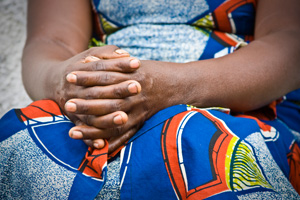Precious in God’s Eyes

In biblical times, lepers were considered unclean and unworthy of human touch. Women who have been raped in the DRC bear that same stigma.
Often, they are rejected by their husbands, families and communities. For the estimated 200,000 women who have been raped in DRC, this rejection fills them with even greater shame.
“When a woman is raped, her body becomes the scene of the crime,” says Jane Wathome, director of the Program Design Group at ABS. “Everywhere she goes, she's stigmatized. She is considered damaged for life.”
Some women sink into deep depression. Others commit suicide. Some live in the bush without access to medical care, food, water or shelter.
Traditional interventions, such as providing food, clothing and shelter, are crucial. Having access to healthcare is another imperative. God's transforming Word is also essential because it helps these women reclaim their dignity and sense of worth. “The Bible teaches us that even in your worst physical self, you're still precious in the eyes of God,” says Wathome.
While the Bible is essential, so too is re-educating the survivor's immediate family, as well as her church and social communities.
But this re-education must be defined using the local context. “All of the stigma is culturally driven, so the solutions must be homemade,” says Wathome.
Finding role models who defy the cultural norm — the men who have embraced their wives after rape — is essential. These “custodians” can be advocates within that culture, showing others that only God's compassion and unconditional love can heal wounded hearts.
Thanks to the support of our faithful financial partners, American Bible Society has been engaging people with the life-changing message of God’s Word for more than 200 years.
Help us share God's Word where needed most.
Sign up to stay in touch with how God is changing lives with his Word!








